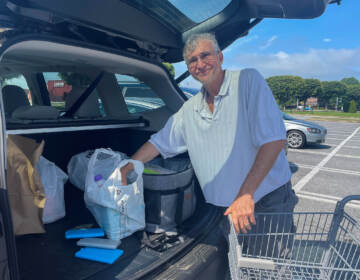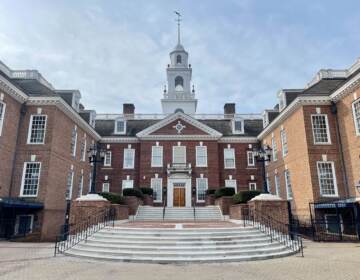Marijuana remains illegal in Delaware as House fails to override Gov. Carney’s veto
Four Democrats and two Republicans changed their vote on legalization. That left the override attempt five votes short of the needed three-fifths majority.

File photo: A marijuana plant grows at the Compassionate Care Foundation's grow house in Egg Harbor Township, N.J. (Julio Cortez/AP)
The yearslong push to legalize marijuana has once again failed in Delaware, as the House couldn’t muster enough votes Tuesday to override Gov. John Carney’s veto of a bill that stripped all penalties for adults over 21 who possess less than an ounce of weed.
Rep. Ed Osienski’s bid to override Carney fell five votes short of the 25 needed for the three-fifths majority required to override a gubernatorial veto. The legalization bill had received 26 votes when it initially passed the House in May before sailing through the Senate. Both chambers had passed the measure with what appeared to be veto-proof majorities, but only if lawmakers didn’t change their votes.
Tuesday’s override attempt, however, only received 20 yes votes in the House. That’s because three Democrats – Sean Matthews, Bill Carson and Andria Bennett — and Republicans Mike Ramone and Jeffrey Spiegelman changed their votes from yes to no. In addition, Majority Leader Valerie Longhurst did not vote after voting yes in May.
The prime sponsor, Democrat Ed Osienski, had urged fellow lawmakers to stick with their original votes and follow the will of Delawareans by overriding Carney, who leaves office in January 2025 after his second term ends.
“We need legalization,’’ Osienski said on the House floor moments before the roll call vote. “So I beg of my colleagues not to wait until 2025 to do this.”
The bottom line, he said in his brief remarks, was that “we need to fix this problem instead of just denying the freedom and the liberty of Delawareans to be able to purchase this product.”
But his words and pleas fell on some deaf ears on a day when advocates for legalization rallied outside Legislative Hall and lobbied inside the building in the hours before the vote.
Afterward, Osienski expressed his disappointment but added, “I feel good that I was working for Delawareans.”
The last time Delaware lawmakers overrode a veto was in 1977, after then-Gov. Pete du Pont had vetoed the state budget.
Carney could not be reached afterward, but spokeswoman Emily David said the governor “thanks the House for today’s vote and respects the role of the General Assembly and all of its members in this process. He looks forward to working with them on the important issues that remain this session.”
Zoë Patchell of the Delaware Cannabis Advocacy Network had been hopeful but wary earlier in the day.
After the vote, she didn’t try to mask her dismay that people who are found with less than 28 grams can still get a $100 civil fine, and that the discovery of marijuana can still be a pretext for searches of a person, vehicle, or home.
“We’re extremely disappointed in House Democratic leadership, as well as the House Democrats who changed their vote from yes to no, as well as the Republicans who changed their vote as well,’’ Patchell said.
“Basically they could have ended cannabis prohibition by the end of this week, but they decided to not have the courage’’ to override the governor’s veto.
“As a result of their actions today, there’ll be thousands of more people with a simple cannabis possession, including intrusive stops that could escalate.”
Patchell acknowledged that the effort will likely be put on hold until after Carney leaves office in 2025.
“We’re going to continue to fight for cannabis legalization no matter what,’’ she said. “This was a bill that was brought to the legislature by the people, for the people. And the people are going to continue to fight for this essential criminal justice reform.”
Nineteen other states and the District of Columbia have legalized marijuana. New Jersey opened its first retail stores in April.
A companion bill Osienski had also sponsored would have created a regulatory structure for a retail market to grow and sell marijuana. That had failed last month in the House by two votes.
WHYY is your source for fact-based, in-depth journalism and information. As a nonprofit organization, we rely on financial support from readers like you. Please give today.






